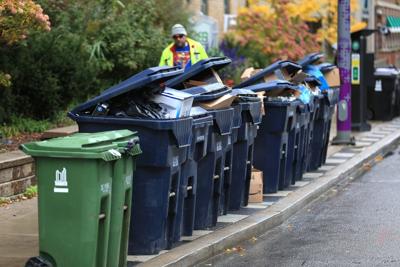Ontario’s Environment Ministry is backtracking on some proposals to significantly delay recycling targets and kill the expansion of long-planned blue box programs.
In June, the ministry proposed a major overhaul of its recycling regulations to lessen the burden on waste producers, who said the province’s plans would lead to significant cost increases. At the time, ministry spokesperson Alexandru Cioban told the Star that the proposals would “increase transparency for all producers and help manage unexpected cost increases — preventing those costs from being passed down to consumers or resulting in job losses.”
This week, Cioban again stressed the importance of transparency and consumer protections. “Ontario is transitioning to full producer responsibility to ensure producers pay for the waste they produce, not taxpayers,” he said.
“As we continue this transition — which will save municipalities hundreds of millions of dollars each year, while ensuring services are available across the province — we continue to work on finding ways to reduce costs and deliver blue box services efficiently to meet the needs of our communities.”
Last summer, the Association of Municipalities of Ontario decried the proposals, saying that lower collection rules mean waste is increasingly dumped in Ontario’s landfills, which are expected to reach capacity in roughly 10 years.
Now, the new regulations to the 2016 Resource Recovery and Circular Economy Act — filed on Sept. 3 — show the ministry walking back its proposed five-year delay for some recycling targets. And it will now give producers a two-year grace period to make their “best efforts” before targets begin in 2027 and 2028 with the potential for financial fines.
Instead of cancelling a planned blue box expansion into multi-residential buildings — specifically those that do not already use the program — the province is now delaying it by five years, until 2031. The regulations will also slightly improve recycling targets for “flexible” plastics such as bags, candy wrappers and film covers on yogurt containers.
Still, many of its June recommendations are now part of the new regulations.
The government moved forward with its plan to remove the requirement for the collection of “away from home” beverage containers left in public places. It also moved forward with the elimination of plans to collect materials — such as paper, food containers or pop cans — in public spaces.
Some of the changes are an improvement over the original proposals, said Peter Hargreave, a long-time consultant in the waste management industry.
“It’s a little less ugly,” he said, “but it still runs counter to the government’s intent when they initially moved this forward. They keep compromising to special interests, and you can expect the lobbying on this to continue because every time groups lobby, the government continues to bend.
“If the government’s goal was to drive increased performance, I don’t think this does that. There have been so many compromises. This approach is not achieving what they set it out to accomplish.”
Within the recycling industry, Thursday’s move came as a surprise.
“It was a mic drop,” said one insider, who was not authorized to speak about the details, referring to the unexpected arrival of the regulations that left some scrambling to make sense of the new rules.
Recycling advocates say it’s yet another example of fluctuating rules that diminish Ontario’s once-lofty plans to hold waste producers responsible for the products they create and build business opportunities by finding new ways to reuse old materials.


























To join the conversation set a first and last name in your user profile.
Sign in or register for free to join the Conversation